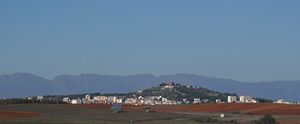This is an old revision of this page, as edited by S0crates (talk | contribs) at 22:25, 15 October 2006. The present address (URL) is a permanent link to this revision, which may differ significantly from the current revision.
Revision as of 22:25, 15 October 2006 by S0crates (talk | contribs)(diff) ← Previous revision | Latest revision (diff) | Newer revision → (diff)Template:Infobox Town GR Kilkis (Greek: Κιλκίς, Slavic: Кукуш Kukush) is a small provincial city in Central Macedonia, Greece. As of 2001 there were 17,430 people living within the city and a total of 24,812 people living in the administrative area of the municipality of Kilkis. It is also the capital city of the prefecture (or nomos) of Kilkis and the capital of one of the two local provinces (or eparchia) of its prefecture.
The city was ruled by the Ottoman Empire before being taken by Bulgaria in the First Balkan War of 1912. In the Second Balkan War of 1913, the Greek army captured the city after a three-day battle between June 19-June 21. Although costly, with over 5,000 casualties on the Greek side and 7,000 on the Bulgarian, the Greek victory proved a decisive step towards victory in the war. Kilkis was almost completely destroyed during the battle, and its 7,000 Bulgarian residents were transferred to Bulgaria as a result of the Treaty of Neuilly, settling, for the most part, in Sofia. The new town was built closer to the railway to Thessaloniki, around the Greek church of Saint George, and was settled by Greeks transferred from Bulgaria and Asia Minor.

The significance of the Battle of Kilkis-Lahanas can be appreciated by the fact that Greece named a battleship after the city. However, Kilkis was sunk by a German Junkers Ju 87 (Stuka) dive-bomber on April 23 1941, along with its sister-ship, in the third week of the invasion of Greece by Nazi Germany. The city of Kilkis came under Bulgarian rule in 1943 when the Bulgarian zone of occupation was expanded to include the prefectures of Kilkis and Chalcidice. The Greeks claim that the Bulgarians pursued a policy of "Bulgarianisation" with considerable brutality and intended to annex the region to Bulgaria, but were forbidden from doing so by their German allies, who feared destabilising Greece if the Bulgarians proceeded. The region became a major centre for partisan resistance activity before being liberated in 1944.
Subdivisions
- Argyroupoli (Αργυρούπολη)
- Xirovryssi (Ξηρόβρυση)
- Zacharato (Ζαχαράτο)
- Kolchida
- Metalliko (Μεταλλικό),
- Sevasto (Σεβαστό)
Municipal districts
- Chorygi
- Kastanies
- Kristoni
- Leipsydri
- Aktopotamia (Ακροποταμιά)
- Ano Potamia (Άνω Ποταμιά)
- Kato Potamia (Κάτω Ποταμιά)
- Megali Vryssi
- Melanthi
- Mesiano
- Dafnochori (Δαφνοχώρι)
- Leventochori (Λεβεντοχώρι)
- Stavrochori
- Vaptisti
- Kyriakeika (Κυριακαίικα)
Famous inhabitants of Kilkis
- Giorgos Floridis, Greek politician, ex minister
- Savvas Tsitouridis, Greek politician, Minister of Employment
- Dimitris Basis, Greek singer
- Kiltidis Kostas, Greek politician
- DAF, famous Greek entertainer
- Goce Delchev, BMARC/SMARO revolutionary (1872-1903)
- Ivan Hadzi Nikolov, Bulgarian Revolutionary (1861-1934)
- Aleksandar Stanishev, Bulgarian physician, scientist and politician (1886-1945)
- Hristo Smirnenski, Bulgarian poet (1898-1923)
- Lazaros Pavlidis, Greek author (1929 - 2004)